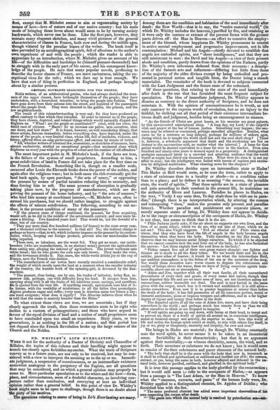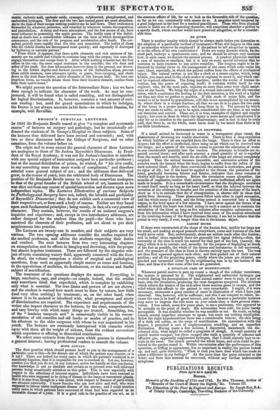• DR. WHITLEY'S LIFE EVERLASTING.
WERE it not for the authority of a Doctor of Divinity and Chancellor of Killaloe, the topics of this volume and their handling might appear to trench too closely upon forbidden mysteries. What the texts of Scripture convey as to a future state, are not only to be received, but may be con- sidered with a view to interpret the meaning as to the ay or no. Immedi- ate judgment, a suspension of consciousness, or an intermediate existence somewhat analogous to the purgatory of the Papists, are all questions that may be considered, and on which a general opinion may properly be come to. More particular speculation as to the where and the how—form, place, and circumstances, seem of a doubtful character, as involving con- jecture rather than conclusion, and conveying at best an individual , opinion rather than a general belief. In this point of view Dr. Whitley's book might seem to be open to challenge, though there is no doubt about 'the piety of his motives.
The questions relating to states of being in Lire Everlasting are many.
Among them are the condition and habitation of the soul immediately after death: the New World—that is to say, the "entire material world," (in which Dr. Whitley includes the heavens,) purified by fire, and retaining as it were only the essence or extract of the present forms with the grosser parts driven off: the Man in Heaven—an effort to conceive the employ- ment of the blessed, whose happiness Dr. Whitley pronounces to consist in active mental employment and progressive improvement, not in idle contemplation : Michael and his Angels—chiefly devoted to establish that angels are embodied spirits, not " sheer intelligences," and that they are still ministrant to men : the Devil and his Angels—a view of their present abode and condition, partly drawn from the opinions of the Fathers, partly Dr. Whitley's own inferences deduced from their accounts : a descrip- tion of the Satanic arts and influences—differing but little from those of the majority of the older divines except by being embodied and pre- sented in personal action and tangible form the Doctor being a stanch materialist. The remainder of the book is devoted to subjects connected with the Last Judgment and the future state of the redeemed.
Of these questions, that relating to the state of the soul immediately after death is the one that has furnished the most frequent subject for speculation. The idea of immediate judgment., Dr. Whitley appears to dismiss as contrary to the direct authority of Scripture, and he does not entertain it. With the opinion of unconsciousness he is wroth, as not only contrary to the express words of revelation, but as an injury to the faithful, by striking out all that period of their existence intermediate be- tween death and judgment, besides being an encouragement to sinners.
"As the friends of Christ are great losers, so his enemies are great gainers, by this unwarranted unseriptural sleep. A long day, my Lord,' is the culprit's wish and prayer at the bar of human justice. Something may happen; the sen- tence may be relaxed or commuted, perhaps cancelled altogether. Besides' what cares he for a sentence so long delayed, perhaps for millions of unborn ages, during which he is taught the world shall last and the soul shall sleep? (These is, however, a scholastic argument that death and the awakening are but an instant to the unconscious soul, no matter what the interval.] A lease for that period would be deemed equivalent to a lease for ever in the market. Even nine hundred and ninety-nine years is deemed equal tea perpetuity. A distinguished geologist announced lately to a crowded and admiring audience that the world would or might last thirty-six thousand years. What were his data it is not my affair to scan; but the intelligence was hailed with bursts of rapture and exulta- tion by delighted multitudes. What cheering news for the sleepers ! "
Dr. Whitley therefore decides upon an intermediate state or Hades? This Hades or Hell would seem as he uses the term, rather to apply to a state of existence than to a locality or abode—to a condition rather than to a place ; and he defines it as meaning "the unseen, the invisible state, the world of spirits." That these spirits are in a state of pleasure and pain according to their conduct in the present life, he maintains on the authority of Dives and Lazarus. Paradise he places in Hades, on the text, "Verily I say unto thee, To day shalt thou be with me in para- dise," (though there is an interpretation which, by altering the comma • and transposing "thou," makes the promise only present, and paradise future). Whether paradise and punishment are separate places, or merely separate states of being, Dr. Whitley does not appear to decide. As to the range or circumscription of the occupants of Hades, Dr. Whitley is not clear, but seems to think that it is the air.
"Flub Judreus justly asks, if the air about us supports our own lives, and the lives of so many others, which we do see, why not also of those which we do not see? This also Virgil suggests. 'Fed on etherial air.' Philo states else where, that they who have lived the life of angels in the body become angels themselves when they leave the body. Tully stumbles on the like truth, and observes that we may become aerial beings ourselves. To which if it be objected that we cannot conceive how the soul lives out of the body, he has also furnished the answer: Let them explain bow the soul lives in the body.' "Fishes cannot live out of their own gross watery element: our lighter and thinner air is death to all the finny tribes. We too would faint and die in the subtler, purer ether of heaven: it would be to us what the intermediate fruid, our ambient atmosphere, is to the fishes of the sea or the monsters of the deep. Nor would those monsters have worse reason to dispute the subsistence and reality of beings above the water, than we have of living conscious agents innu- merable, above our air or atmosphere. "Adam and Eve, together with all their vast family, all their unnumbered descendants of every rank and grade, of every name and nation, though they have departed this life and are no more seen of men, are not therefore asleep nor unconscious, neither insensible nor dead. The soul is NOT buried in the same grave with the corpse; much less is it extinct and annihilated: it is still alive— awake somewhere. Even now it is in greater happiness or misery than before the death of the body: it has full possession of all its conscious powers, moral or immoral sentiments, pious or impious tempers and affections, and in a far higher degree of vigour and energy than before in the flesh.
"The departed spirits of all the sons of Adam live, move, and have their being somewhere in the world ; and perhaps much less remote from us than we will allow ourselves to think or are disposed to imagine. * * •
"If evil spirits are going up and down, with Satan at their head, to tempt and to pervert us, there Is a world of spirits all around us, in conscious intelligence, moral or immoral energy and activity, far superior to ours. Into this world of life and action the human spirit enters at death, to mix with others like itself, in joy or wo, piety or blasphemy, enormity, and iniquity, for ever and ever."
The beings in Hades are material ; for though Dr. Whitley constantly uses the word spirit, he never means it to be taken in an immaterial sense. Invisibility is their characteristic ; but that is no argument against their materiality,—as witness electricity, scents, the wind, and so forth. Their structure or substance we do not know ; but it would seem to consist of the finer substances and purer elements of the natural body.
"The body that shall be is the same with the body that now is, inasmuch as it shall be refined and spiritualized or sublimed and rarified out of it; the essence, extract, or gas, being the same in both, however alloyed and debased in the na- tural body, however purified, sublimed, and glorified in the spiritual body."
It is true this passage applies to the body glorified by the resurrection; but it would still seem tJ refer to the occupants of Hades,—as appears from a passage in "The Last Adam, or the Man in Heaven." To know what the "essences, extracts, and gases" of the human body were, Dr. Whitley applied to a distinguished chemist, Dr. Apjohn of Dublin ; who furnished him with the list.
"The same profound chemist has added some important observations of his own respecting the corpse after death.
"' The gases into which the animal body is resolved by putrefaction are--am- monis, carbonic acid, carbonic oxide, cyanogen, sulphureted, phosphureted, and carbureted hydrogen. The first and the two last-named gases are most abundant. As to the time of their escape nothing 1st:skive can be laid clown. Their evolution is forwarded by whatever promotes, and retarded by whatever resists decomposition and putrefaction. A damp and warm atmosphere, and the free access of air, have most influence in promoting the septic process. The bodily state of the indivi- dual at death has a considerable influence on the time at which decomposition commences, and the rate of its progress and acceleration after death. The cor- pulent putrefy more rapidly than the thin and emaciated. The bodies of those who die violent deaths are decomposed most quickly; and especially if destroyed by lightning or narcotic poisons.' "From which it appears, that these noble elements and rich essences of hu- manity are too subtle and volatile to continue long with the corpse; but soon dis- engage themselves and escape from it. After which nothing remains but the foul refuse in the vat; the mere capnt mortnum in the crucible; the vile dust and ashes of the tomb. Nor does inhumation, however deep in the ground, nor drown- ing in the lowest depths and darkest caverns of the fathomless abyss, prevent those subtle essences, rare attenuate spirits, or gases, from escaping and chain down to the dust those better, nobler elements of the human body. No bars can imprison them, no vessels detain them from their kindred element, confine them from their native home."
We might pursue the question of the Intermediate State; but we have done enough to indicate the character of the work. As may be con- jectured, it will be found what is called rambling, and not distinguished for logical discrimination. It, however, contains a vast amount of curi- ous reading : but, amid the grand speculations in which he indulges, the Doctor is not always accurate in his facts—he confounds Damien, for example, with Ravaillac.



























 Previous page
Previous page